 |
| Josie Hess sets up a scene for Morgana |
Morgana Muses was in her late forties when she got divorced. With no friends and no support, she thought that everything was over for her, and made serious plans to end her life. Within a couple of years, however, she was an international porn star winning acclaim in feminist circles and surrounded by friends and admirers. Josie Hess and Isabel Peppard’s documentary about her – which also covers what happened when she realised she still had other battles to fight – is one of the more unusual offerings at this year’s Fantasia Film Festival. Despite the challenges posed by the time difference between Scotland and Australia, where the two directors are based, we managed to connect, and they told me how their film came to be.
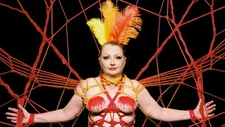 |
| Morgana on her 50th birthday |
“Josie already knew Morgana,” says Isabel. “I ended up meeting her through Josie and they invited me to come and work with them on Morgana’s birthday celebration, which involved her suspension on the form of the phoenix. When I learned how she’d been this suppressed housewife in suburban Australia, I was really interested in this character transformation and what makes someone make such a big change in life, but I also felt that I hadn’t seen a character like her really represented before, with a middle-aged woman quite comfortable exploring this side of herself and being the protagonist.”
“Izz and I had already been working together and I was working for Morgana separately,” adds Josie. “We had bonded originally over smashing the patriarchy and things like that and the early days of the resurgence of third wave feminism on the internet, and then when Morgana was doing her 50th birthday and we found out more about her, we were like ‘Holy shit!!’ This woman is like next level pushing the boundaries of what women can do, and sort of giving and sort of giving an example of where you can go, like there is no end point to your sexual freedom. You can be a sexual person on and into the future. So it was really exciting to tell her story.”
The two of them were approaching the story from different angles, Isabel observes. Josie and Morgana already had quite an intimate relationship, whereas she was able to stand back. “So I was getting to know her as the audience was getting to know her.”
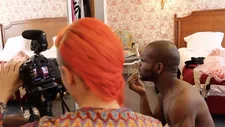 |
| Josie setting up a shot |
“We spoke a lot about the ethics of documentary and how to achieve subjectivity,” says Josie. “I guess Morgana was somebody who was already telling her story. When I was working for her early on she was courting the press and putting her story out there. She’d already had her films win several feminist porn awards, so I think when we came onto the scene she was already very keen to have her story told. It wasn’t like we have to coerce or push or even ask. She was very much like ‘Would you like to film this stuff for the documentary,’ and we were like ‘Yes.’”
It’s an intimate film in a way that goes far beyond sexuality, with Morgana talking very openly about other sensitive topics such as her struggles with bipolar disorder. Was to difficult to breach those issues with somebody they already knew outside the professional context of the film?
“I think when this started she was in a different place, and obviously we didn’t know where her story was gong to go when we started filming,” says Josie. “With the more intimate elements, I think she was, by that time, very willing to be open because she was wanting to show the reality of what it’s like living with a situation like she has. Again, we didn’t have to do a lot of convincing. She was very keen to have that aspect shown truthfully, and in actual fact she’d made her own film, The Life Of Bi, about that stuff.”
Isabel concurs. “We did build a rust relationship with Morgana and Josie had a personal relationship with her, a very close relationship, which she still does have. They’re close friends. And you know, we interviewed her over years, so we got to know each other quite well. I think she also understood that, even though we’re from different generations, this was stuff that really resonated with us on a personal level, with our emotional experience and our experience just of being women in the world. I think there was a lot of group empathy around some of that stuff and that’s one of the other big reasons what we were so interested in telling her story.
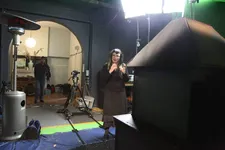 |
| Isabel Peppard on the set of Morgana |
“We’re almost all three different generations. Almost,” she continues with a small laugh. “And she just comes from this very, very conservative background. We’re all from different backgrounds but unfortunately all of the stuff she was talking about in the modern society still does resonate for women... And I think we’re also interested in her as this kind of female hero. I guess, in a very male dominated cinema, to be strong is to be one thing, which is to be tough, and there’s this single layer idea of what a kick arse, tough woman character is, and I think that there’s this really beautiful kind of duality about her that we really related to where she’s both extremely strong and resilient and very raw and vulnerable as well, and that’s something I think about a lot pertaining to female strength and female leadership.”
“It’s amazing to have someone like that as an example of who you could be,” says Josie. “I had never met anyone like Morgana so just to see that that’s an option for you is illuminating.”
“Men have responded to it quite strongly as well, with a lot of empathy, and that’s been really encouraging,” says Isabel. “For some men - #NotAllMen – there’s been a lot of information in there, seen from a different perspective, and maybe she reminds them of the their mother a little bit. It’s actually been really heartening to go those really deep, intense responses from men.”
Does she think that’s because it tackles universal issues around ageing or because there are still so few genuine stories about female sexuality in cinema?
“Yeah,” she says. “I think it’s a combination of both. I think we don’t see a lot of stories about female sexuality as it pertains to women in their fifties, and there’s this idea that has persisted, that we expect female sexuality to become invisible at a certain point because that’s what the patriarchal society has wanted, historically. I think t develops an extra layer when it’s from somebody who could be your mother!” She laughs.
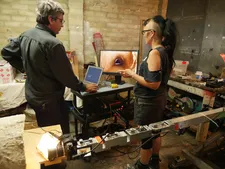 |
| Technical work in Morgana |
“Morgana talks about that a lot to, where there’s this idea that as soon as you become a mother, you have children, then your sexuality’s turned off and your function now is just to raise the children and make the husband happy,” says Josie. “That idea still exists. There’s that moment, for men, where they’re like ‘Oh shit, maybe my mum’s got her own desires!’ and you’re like ‘Yes. She is a person.’”
Some of the scenes of Morgana’s earlier life, when she felt trapped in a stale existence in the suburbs, are really quite shocking.
“I honestly thought, when I first heard it, that it was like she was raised in the Fifties or something,” Josie responds. “I had no idea that that was still going on so publicly in modern society. It really seems like a retrograde thing but it isn’t.”
“I’ve had random conversations with other women who have said ‘That’s literally my story!’” puts in Isabel. “And some men as well. I think we live in a very left wing kind of bubble but in the suburbs of Australia it isn’t like that. We still live in a society that was designed for men so the expectation is that you’re a sex object, then you’re a mother, then you shepherd these children into being and then you just quietly fade into the background. Your role is over then. Possibly, in old societies, older women were valued in other ways – as wise women, as healers – but in this society that we have now there is this idea that you do become invisible, and a lot of women talk about that. My mother talks about that.”
It’s also a film that challenges stereotypes in its celebration of fat bodies. The final scene takes a genre cliché and subverts it by showing Morgana enjoying her body as it is. Was it important to them to show somebody with that type of figure having fun?
“Totally,” says Josie. “I was with Morgana when she first realised that other cultures venerate her body, and she was like ‘Oh, my God! The Japanese love me! The Germans love me!’ It was really sweet to watch her realise that. But I always like to shoot bodies because I think there’s beauty everywhere. I shoot bodies to show desire and what I think is sexy across the board.”
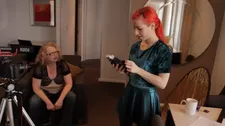 |
| Preparing a shoot in Morgana |
Isabel nods. “I think for me, growing up – and it was probably the same for Josie – we’re taught to constantly scrutinise ourselves and feel shame, like if you don’t have that kind of media airbrushed image, with no lumps and bumps...” She shrugs. “I know for me, I grew up feeling shame about my body. I don’t have the same body type as Morgana but, you know, I still didn’t have the ideal body type either.
“To see a body like Morgana’s represented in this beautiful way that’s so respectful, it just shows that we’re all entitled to that, without feeling shame about it. I think it’s very liberating to see that. It made me feel liberated.”
Having shot so much material over a period of five years, how did they know where to begin when it was time to edit it all together?
“Initially it was going to be a short film!” Isabel laughs. “It was going to be a calling card for me and Josie’s production company. The first thing that we shot was her 50th birthday installation, where she was in the red rope. I think one of the things that attracted us both was the creativity of this situation where she would keep doing these crazy, over the top gestures and then we’d kind of mirror them with our gestures. So because she started with this phoenix image and I come from stop motion animation and do miniature work, we were like ‘Okay, why don’t we backtrack this and build this cardboard suburb façade and then burn it down so we’re mirroring her psychological journey through these miniature environments?’ And then the phoenix was the culmination and of this which would have been he short film, which wouldn’t, probably, have been so interesting.
“So that really affected us, and then as things continued she evolved as a character, her story changed, and she and Josie were doing some really creative things with the films that they were working on together, so we were all kind of feeding off each other in this three way creative thing. We found an eventual structure where there were two cycles of death and rebirth.”
“You shoot when and where you can,” says Josie when I ask how they managed to keep filming the project over five years.
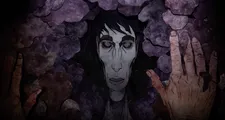 |
| The Grave Of Saint Oran |
Isabel explains that there were times when the level of work involved got really intense, especially in the run-up to their first festival screenings.
“We had two or three before the world had a bit of a pandemic going on,” says Josie. “For the last three or four months we’ve been doing all the online festivals which is cool because the accessibility is great. People in the suburbs, people in the country can come and watch the films too. It’s not just people in the six cities. But definitely the lack of parties and free drinks and free food is a casualty of this situation.”
So how do they feel about being selected by Fantasia?
“It’s amazing. I would have loved to go,” says Isabel.
“It’s always really validating when a giant festival like that chooses you,” adds Josie. “We’re just like ‘Holy shit!’ it’s amazing.”
They’re hoping to work together again in the future but are both busy with separate projects now. Josie explains that she also has another film at Fantasia, as she produced the short The Grave Of Saint Oran, which is based on a poem by Neil Gaiman. Isabel, meanwhile, is writing a horror film and working on a stop motion virtual reality project that will put people inside a world of handmade sets and puppets.
Morgana will screen at Fantasia on demand.





















